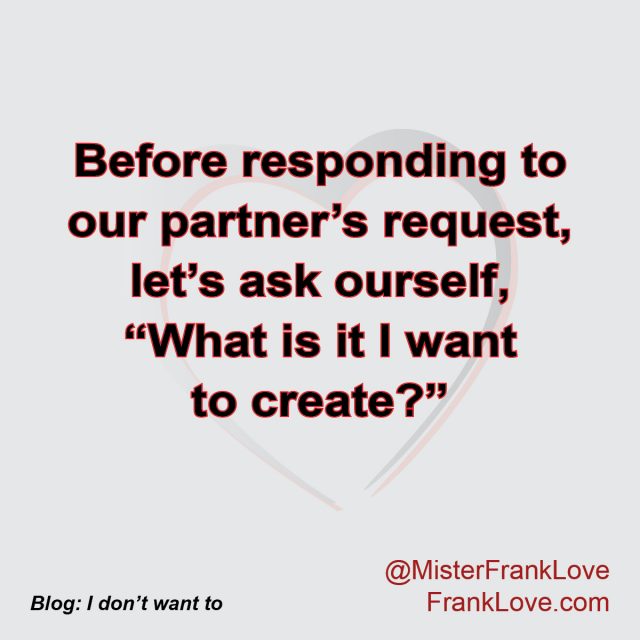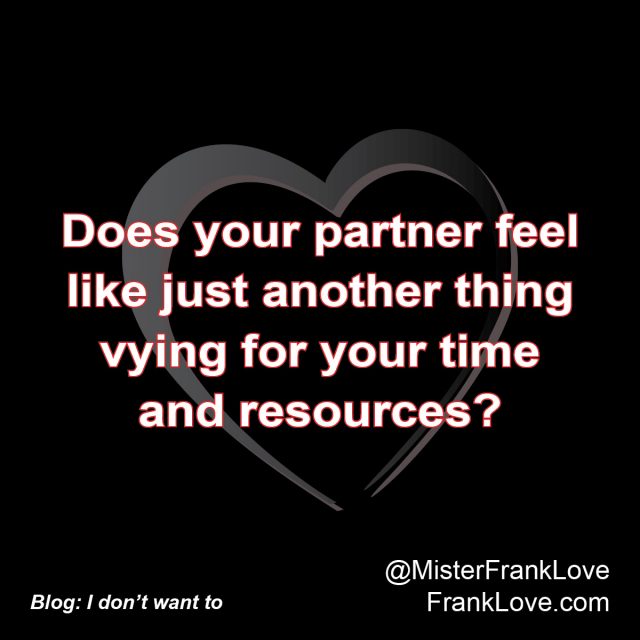
In my previous blog “You Didn’t Think To…” I discussed the importance of word choice in developing respect inn our loving relationships. Today’s blog post will examine why we need to look past our individual desires sometimes to support our loving relationships.
“I don’t want to do that” is often a declaration that many of us in partnerships make. It has a degree of power attached to it. Some of us are proud to say, “I didn’t do it because I didn’t want to do it.” Admittedly, there are times when this is important. But things get hairy when we are clearer about what we don’t want to do than what we wish to create.
River asked Jordan to go to a holiday party with them. Jordan responded, “I don’t want to,” and didn’t go. As an isolated incident, this wasn’t a problem for River. However, this incident wasn’t isolated. In fact, Jordan had rejected River’s last five offers for them to hang out together. The pattern was bothersome to River, and River informed Jordan of the displeasure.
River asked, “Does it matter to you if I want you to do something?”
Jordan replied, “Yes, but not at the expense of what I want to do.”
“Are you suggesting that we should only do the things with or for one another that we want to do? Should we avoid doing things for the other in order to accommodate or satisfy them?”
Jordan was shocked at the simplicity of the question from River and took a moment to consider its magnitude before answering. Initially, Jordan wanted to say yes, but there was a preposterousness that became evident.
If I only do what I instinctively feel like doing, and River does the same, things might get very lonely around here. After all, River may not feel like accommodating or satisfying me in exchange for River’s personal satisfaction. Instinctively, I prefer to watch the television show that I like compared to that of someone else. The same for movies, restaurants, or concert artists. The items that help to drive this point home can be endless. But how do I make sure that my needs are taken care of?
But there was more. There was an underlying possibility that quid pro quo (mine for yours) or equity may rear its head in Jordan and River’s dealings. “I’ll rub your back if you’ll rub mine.” “I’ll partner with you if you’ll partner with me.” “You can fall asleep in my arms tonight if I can fall asleep in your arms tomorrow.” There is a scorekeeping component to all of this that can take on a life of its own. One that can become anything but loving and caring. Jordan didn’t want that.
To avoid the scorekeeping paradigm, I encourage partners: don’t keep score. Instead of keeping score, take care of one another in ways that are meaningful to each person. This starts with a declaration and a belief that “We are here to take care of each other.” And it can be beautiful. People wish to be taken care of in different ways. Some people like to be sung to sleep. To their partner, the idea could sound absurd. Another partner may want to be massaged. However an individual wants to be taken care of, it is incumbent upon their partner to be invested in and committed to giving the partner what matters to them.
However, what completely changed Jordan’s mind was the realization and revelation that there are some areas where we must partner. We cannot co
Sure, we can hire a temporary partner. We can hire a masseuse instead of asking our partner to rub us. We can go dancing at the club and find a temporary dance partner there. Then another the next night and so on. But Jordan wanted to create an environment where Jordan and River worked to love and support one another in perpetuity. If Jordan only worked within temporary relationships, Jordan would be giving up on the perpetually loving and satisfying culture with River.
Finally, there is the “I don’t need a partner because I don’t want anything” dynamic. This is what I say when I delude myself into thinking that a way out of partnership is to adopt the belief that “I don’t want anything” or “I don’t need anything from anybody.” This perspective is often adopted by someone who has given up on themself and their ability to partner long-term with others.
Temporary relationships are fine for a person who does not aspire to have long-term relationships. However, if we are honest with ourself and want a long-term partner, we must cultivate a long-term partnership. We must be able to say, whether comfortable or not, “I want a partner, and I do want to create things that partnerships bring.” Then we do the work.
Before we use “I don’t want to” as a response to a partner, let’s make sure we are satisfactorily nurturing our partner first. If we are not, we are not effectively partnering. We get to willingly give our partner our time in a manner that is meaningful to them.
This is the level of care that I strive to live by. It is one that, in my humble opinion, captures how attuned each of us can be to the well-being of another. Our partner gets to be the first recipient.
In summary:

- If we wish to thrive in a partnership where both parties are satisfied, we must support our partner in ways that are meaningful to them.
- Taking care of each other is an opportunity to serve that we must embrace with love and time. It is not a contest.
- There are people who do not want long-term partnerships. However, others act as though they do not want a long-term partnership as a way out of doing the required work. If we want a long-term partnership, acknowledge that desire; then do the work.
- The ability to act from a place that reflects and invests in what we wish to create in our relationship will go a long way toward creating a loving culture.
Keep Rising,
Frank Love
In my next blog post, “Before Requesting More Time,” we will discuss situations where we need to meet our own needs rather than expecting someone else to do it.
Watch Frank Love’s presentation “The Act of Caring.”
Subscribe to receive Frank’s weekly blog.
Become a sponsor of Frank Love and his work creating loving cultures in our relationships with a monthly contribution of as little as $2. Sign up today at Patreon.com/FrankLove.
–—–—–—–—–—–—–—–—–—–—–—–—–—–—–—–—––
Each week, Frank Love hosts Zoom support group meetings that assist women and men as we work to create a loving culture in our relationships. Calls occur from 7 p.m. to 8:30 p.m. EST and can be accessed by visiting FrankWeeklyCall.com.
- Tuesdays—Black Women: Creating a Loving Culture in Our Relationships
- Thursdays—Black Men: Creating a Loving Culture in Our Relationships
–—–—–—–—–—–—–—–—–—–—–—–—–—–—–—–—– –
Frank Love coaches individuals toward creating a loving culture in their family. He is also the author of Relationship Conversations You Don’t Want to Have (But Should Anyway) and 25 Ways to Be Loving. To schedule a free consultation, contact Frank at Frank@FrankLove.com.

